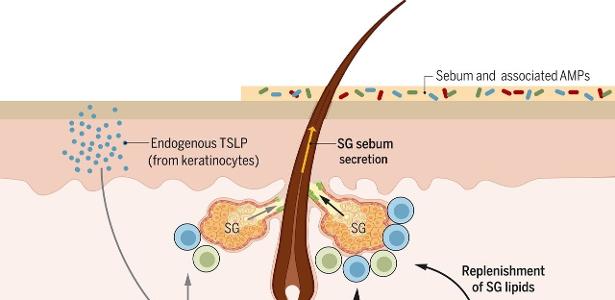
American scientists have discovered a new weight-loss treatment that makes mice sweat to get rid of large amounts of fat by eliminating energy-rich fats. Researchers envision a future in which the same principle could be used in humans to fight obesity. Until then, contrary to popular belief, Sweating is not directly related to calorie loss, it only serves to control body temperature.
Scientists have now discovered that it is possible to stimulate stomach fat loss by targeting the immune system. Publish the research in the journal Sciences.
They made this discovery after treating mice with TSLP. Thymus lymphopoietin) – a type of immune system protein – which led to significant fat and weight loss.
Unexpectedly, however, this was not caused by decreased food intake or a faster metabolism, but because TSLP stimulates the immune system to release fat through the skin’s producing sebaceous glands.
“This was a completely unexpected discovery, but we demonstrated that fat loss can be achieved by excreting calories from the skin in the form of energy-rich fat,” study lead author Taku Kambayashi from the University of Pennsylvania, USA, told the British newspaper. daily Mail.
“We believe we are the first group to show a non-hormonal way to induce this process, highlighting an unexpected role for the immune system in the body.”
What does this mean for humans
Kambayashi said the findings support the theory that increasing sebum production by the immune system could be a strategy for treating obesity in humans. Researchers have been studying the role of TSLP, which is involved in the process of asthma and other allergic diseases, in activating type 2 immune cells and expanding regulatory T cells.
Previous studies suggested that these cells could regulate energy metabolism, so Kambayashi’s team speculated that giving TSLP to overweight mice could stimulate an immune response that would counteract some of the harmful effects of obesity.
“At first, we didn’t think TSLP would have any effect on obesity itself. What we wanted to find out was whether it could affect insulin resistance,” Kambayashi explained.
The acceleration of sebum production in humans could lead to what they call “oily perspiration” and thus weight loss, the researchers said, which they plan to test in the future.
“I don’t think we naturally control our weight by regulating sebum production, but we may be able to stop the process and increase sebum production to cause fat loss,” Kambayashi said. This could lead to new therapeutic interventions that reverse obesity and lipid disorders.

“Proud explorer. Freelance social media expert. Problem solver. Gamer.”





